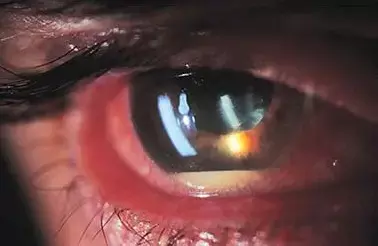- Home
- Medical news & Guidelines
- Anesthesiology
- Cardiology and CTVS
- Critical Care
- Dentistry
- Dermatology
- Diabetes and Endocrinology
- ENT
- Gastroenterology
- Medicine
- Nephrology
- Neurology
- Obstretics-Gynaecology
- Oncology
- Ophthalmology
- Orthopaedics
- Pediatrics-Neonatology
- Psychiatry
- Pulmonology
- Radiology
- Surgery
- Urology
- Laboratory Medicine
- Diet
- Nursing
- Paramedical
- Physiotherapy
- Health news
- Fact Check
- Bone Health Fact Check
- Brain Health Fact Check
- Cancer Related Fact Check
- Child Care Fact Check
- Dental and oral health fact check
- Diabetes and metabolic health fact check
- Diet and Nutrition Fact Check
- Eye and ENT Care Fact Check
- Fitness fact check
- Gut health fact check
- Heart health fact check
- Kidney health fact check
- Medical education fact check
- Men's health fact check
- Respiratory fact check
- Skin and hair care fact check
- Vaccine and Immunization fact check
- Women's health fact check
- AYUSH
- State News
- Andaman and Nicobar Islands
- Andhra Pradesh
- Arunachal Pradesh
- Assam
- Bihar
- Chandigarh
- Chattisgarh
- Dadra and Nagar Haveli
- Daman and Diu
- Delhi
- Goa
- Gujarat
- Haryana
- Himachal Pradesh
- Jammu & Kashmir
- Jharkhand
- Karnataka
- Kerala
- Ladakh
- Lakshadweep
- Madhya Pradesh
- Maharashtra
- Manipur
- Meghalaya
- Mizoram
- Nagaland
- Odisha
- Puducherry
- Punjab
- Rajasthan
- Sikkim
- Tamil Nadu
- Telangana
- Tripura
- Uttar Pradesh
- Uttrakhand
- West Bengal
- Medical Education
- Industry
Systemic corticosteroids significantly improve visual outcomes in endophthalmitis

The role of steroids via any route of administration in endophthalmitis is controversial, oral steroids have traditionally had an important role in the initial management of this condition. In the Endophthalmitis Vitrectomy Study, a landmark prospective trial, all patients were treated with oral corticosteroids. Oral steroids such as prednisone have ocular penetration, but it is unknown whether systemic steroid administration may have a superior benefit on visual outcomes when compared directly with topical or intravitreal steroid administration. For this purpose, researchers of Duke University school of medicine conducted a study to characterize practice patterns and compare visual outcomes in patients with endophthalmitis who did or did not receive systemic corticosteroid therapy.
It was a retrospective, nonrandomized comparative trial. The researchers evaluated 133 eyes of 130 consecutive patients diagnosed with endophthalmitis at the Duke Eye Center between January 1, 2009, and January 1, 2018, with at least 6 months of follow-up from the time of initial diagnosis. They assessed clinical presentation, initial management decisions, outcomes and complications. They also assessed Visual acuity (VA) at presentation with endophthalmitis and 6 months after for every patient. A total of 33 eyes (25%) treated with oral steroids received further analysis. Upon analysis, they found oral steroid use was associated with culture-positive endophthalmitis (odds ratio [OR] 2.7), hypotony (OR, 4.2), conjunctival hyperemia (OR, 2.6), and anterior chamber fibrin on examination (OR, 2.7). They noted Endogenous endophthalmitis cases were less likely to receive oral steroids (OR, 0.2). They also found patients treated with oral steroids were more likely to show VA improvement of 3 lines or more after endophthalmitis (OR, 2.8 and exhibited greater improvement from presentation to month 6 (–1.102 logarithm of the minimum angle of resolution [logMAR] vs. –0.655 logMAR).The authors concluded, "Systemic corticosteroid therapy was associated with improved visual outcomes in endophthalmitis. The decision to administer oral steroids was significantly associated with hypotony, conjunctival hyperemia, and fibrinous reaction on the presentation".
They further added, "Culture-positive cases were more likely to receive oral steroids, whereas patients with endogenous endophthalmitis were less likely to receive oral steroids. A prospective, randomized trial of systemic corticosteroid use in endophthalmitis may be warranted".
Medical Dialogues Bureau consists of a team of passionate medical/scientific writers, led by doctors and healthcare researchers. Our team efforts to bring you updated and timely news about the important happenings of the medical and healthcare sector. Our editorial team can be reached at editorial@medicaldialogues.in.
Dr Kamal Kant Kohli-MBBS, DTCD- a chest specialist with more than 30 years of practice and a flair for writing clinical articles, Dr Kamal Kant Kohli joined Medical Dialogues as a Chief Editor of Medical News. Besides writing articles, as an editor, he proofreads and verifies all the medical content published on Medical Dialogues including those coming from journals, studies,medical conferences,guidelines etc. Email: drkohli@medicaldialogues.in. Contact no. 011-43720751


